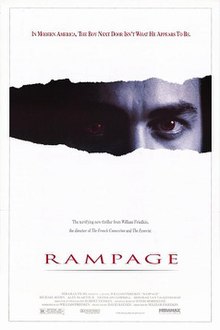Rampage (1987 film)
| Rampage | |
|---|---|
 Promotional film poster | |
| Directed by | William Friedkin |
| Written by | William Friedkin, William P. Wood (novel) |
| Produced by | William Friedkin, David Salven |
| Starring | Michael Biehn, Alex McArthur, Nicholas Campbell |
| Cinematography | Robert D. Yeoman |
| Edited by | Jere Huggins |
| Music by | Ennio Morricone |
| Distributed by | Miramax Films (USA) |
Release date | 1988 |
Running time | 97 min |
| Country | |
| Language | English |
Rampage is a 1988 movie directed by William Friedkin. It was filmed in Stockton, California in 1986.
Synopsis
Alex McArthur plays a serial killer named Charlie Reece, who commits a number of brutal mutilation-slayings in order to drink blood as a result of paranoid delusions.
Reece is soon captured; Most of the movie revolves around the trial and the prosecutor's attempts to have Reece found sane and given the death penalty. Defense lawyers, meanwhile, argue that the defendant is not guilty by reason of insanity.
The prosecutor, Anthony Fraser (played by Michael Biehn), was previously against capital punishment but seeks such a penalty in the face of Reece's brutal crimes after meeting one victim's grieving family.
In the end, Reece is found sane and given the death penalty, but Fraser's internal debate about capital punishment is rendered academic when Reece is found to be insane by a scanning of his brain for mental illness.
Influences
Charlie Reece is loosely based on the real-life serial killer Richard Chase.[1]The crimes Reece commits are slightly different from those that Chase committed, however; Reece kills three women, a man and a young boy, while Chase killed two men, two women, a young boy and a 22-month-old baby. Additionally, Reece escapes at one point, murdering two guards and later a priest, which Chase did not do in real life. However, Reece and Chase were similar in that they both had a history of mental illness and an obsession with drinking blood. Like Reece, Chase was also sentenced to death but committed suicide before the sentence could be carried out.
External links
Footnotes
